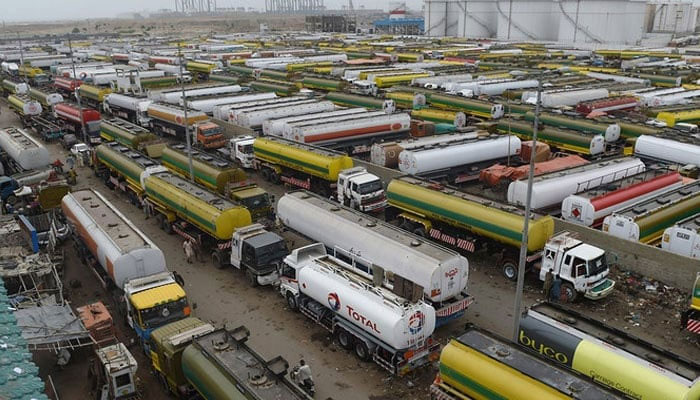Furnace oil exports surge due to low domestic demand
KARACHI: The country exported approximately 300,000 metric tonnes (MT) of furnace oil in the first quarter of this financial year, compared to around 100,000MT in the same quarter of the previous financial year.
This significant increase in furnace oil exports during the current financial year is attributed to low domestic consumption for power generation.According to figures from the oil sector, Pakistan exported 116,000 MT of furnace oil in July, followed by 67,000MT in August and 114,000MT in September.
Industry insiders indicated that the surge in fuel oil exports resulted from minimal use for electricity generation, even during the summer. Refineries were compelled to export this fuel oil to sustain their operations.
Currently, the country has over 500,000MT of usable fuel oil stocks, with refineries holding 148,000MT and oil marketing companies (OMCs) possessing 292,000MT. The remaining fuel oil is located in the pipeline system of Pak Arab Refinery Limited (Parco).
Parco has the largest quantity of fuel oil at 98,000 MT, followed by Pakistan Refinery Limited with 20,000 MT, along with other refineries also holding stocks. To maintain operations, the refining sector is selling fuel oil at lower rates in the global market, as limited storage capacity at refineries cannot accommodate such large quantities of furnace oil, industry sources noted.
Refineries are eager to reduce furnace oil production under the new refining policy. However, the upgrade agreements remain unresolved, as the government has yet to respond to the refineries’ demand to eliminate the sales tax exemption on petroleum products. The policy aims to cut high-sulphur fuel oil output by 78 per cent, from 15,500 tonnes per day to 3,400 tonnes per day. It also calls for a substantial decrease in the production capacity of fuel oil at refineries, as upgraded facilities will focus on producing more gasoline and diesel from crude oil.
Existing refineries are encouraged to modernize and expand to produce environmentally friendly fuels that meet Euro-V standards, while maximizing motor gasoline and diesel output and minimizing furnace oil production.
-
 Worst Cricket Moments That Shocked The Game
Worst Cricket Moments That Shocked The Game -
 Prince Harry, Meghan Markle Reach A Crossroads: ‘You Could Lose Everything’
Prince Harry, Meghan Markle Reach A Crossroads: ‘You Could Lose Everything’ -
 F1 Title Race: Who Will Win 2026 Drivers’ And Constructors’ Championships?
F1 Title Race: Who Will Win 2026 Drivers’ And Constructors’ Championships? -
 New Observatory Sends 800,000 Asteroid Alerts In One Night
New Observatory Sends 800,000 Asteroid Alerts In One Night -
 Cher’s Son Elijah Blue Allman Apprehended On Two Counts Of Assault At Elite Prep School
Cher’s Son Elijah Blue Allman Apprehended On Two Counts Of Assault At Elite Prep School -
 Beatrice, Eugenie Now Face Andrew, Sarah's ‘nightmares’: 'They're Hugely Conflicted'
Beatrice, Eugenie Now Face Andrew, Sarah's ‘nightmares’: 'They're Hugely Conflicted' -
 X Debuts Topic Filtering To Help Users Shape Their ‘For You’ Recommendations
X Debuts Topic Filtering To Help Users Shape Their ‘For You’ Recommendations -
 Scientists Built World's First Computer That Learns Like Human Brain
Scientists Built World's First Computer That Learns Like Human Brain -
 Robert Carradine’s Daughter Makes Bombshell Confession As Actor's Death Cause Confirmed
Robert Carradine’s Daughter Makes Bombshell Confession As Actor's Death Cause Confirmed -
 Beatrice, Eugenie Put On Blast: ‘Only Nitwits Wouldn’t See An Association With A Pedophile As Toxic’
Beatrice, Eugenie Put On Blast: ‘Only Nitwits Wouldn’t See An Association With A Pedophile As Toxic’ -
 OpenAI Defies Industry Pressure, Secures Guardrails Under New US Defense Department Pact
OpenAI Defies Industry Pressure, Secures Guardrails Under New US Defense Department Pact -
 'Sinners' Delroy Lindo Breaks Silence On BAFTA's Tourette’s Incident At NAACP Image Awards
'Sinners' Delroy Lindo Breaks Silence On BAFTA's Tourette’s Incident At NAACP Image Awards -
 Billy Joel Admits Cancelling Of Tour Due To Brain Disorder 'sounds A Lot Worse' Than It Is
Billy Joel Admits Cancelling Of Tour Due To Brain Disorder 'sounds A Lot Worse' Than It Is -
 US And Israeli Strikes On Iran: Everything You Need To Know
US And Israeli Strikes On Iran: Everything You Need To Know -
 US Strikes On Iran Ignite Emergency Push For Powers Legislation: Report
US Strikes On Iran Ignite Emergency Push For Powers Legislation: Report -
 Kelly Osbourne's Mom Sharon Receives 'shut Up' Call Accepting An Award For Late Hubby?
Kelly Osbourne's Mom Sharon Receives 'shut Up' Call Accepting An Award For Late Hubby?




